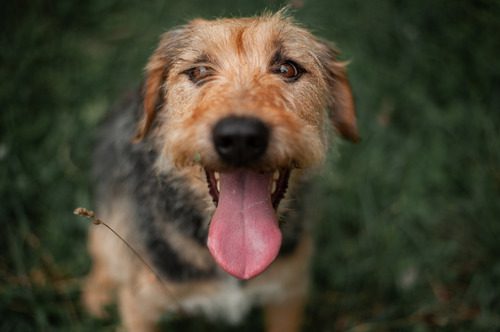As a pet parent, you’ve likely noticed your dog panting after exercise or during a hot day. But what if your dog is breathing heavily without an obvious reason? Heavy breathing can signal various health concerns, some of which may require immediate veterinary attention. In this blog, we’ll discuss potential causes for your dog’s labored breathing, explain what symptoms to watch for, and provide guidance on when to contact your veterinarian. If your dog is breathing heavy and you’re concerned, call Central Broward Animal Hospital at (954) 792-6223 for expert care in Fort Lauderdale.

What Is Considered Heavy Breathing in Dogs?
Dogs naturally pant as a way to regulate their body temperature, but heavy breathing goes beyond normal panting. Heavy breathing may appear as labored, rapid, or unusually loud breathing. Unlike the quick, shallow breaths of normal panting, heavy breathing often involves excessive chest movement and may be accompanied by other symptoms, such as coughing, wheezing, or lethargy.
Signs of Abnormal Breathing
Heavy breathing can manifest in several ways, and recognizing the difference between normal and concerning patterns is key:
- A resting dog typically breathes 10-30 times per minute. Anything significantly above this range may be abnormal.
- If your dog isn’t cooling off from exercise or heat, open-mouth breathing could indicate distress.
- Wheezing, snorting, or rattling noises may accompany heavy breathing.
- Noticeable use of chest and abdominal muscles suggests your dog is working harder to breathe than usual.
What Commonly Causes Heavy Breathing in Dogs?
Heavy breathing can stem from various conditions, ranging from mild to serious. Identifying the root cause helps determine the appropriate next steps.
Heat Exhaustion or Overheating
Dogs don’t sweat like humans; they rely on panting to cool down. However, excessive heat can overwhelm their ability to regulate temperature, leading to heavy breathing. This is particularly common in Fort Lauderdale’s warm climate, where dogs can overheat quickly during outdoor activities.
Signs of Heat Exhaustion
- Excessive panting
- Drooling
- Weakness or collapse
- Red or pale gums
If you suspect your dog is overheated, move them to a cool area and contact your veterinarian.
Respiratory Infections
Infections in the upper or lower respiratory system can make breathing difficult. Conditions like kennel cough or pneumonia often lead to heavy breathing, along with symptoms like coughing, nasal discharge, and fever.
Heart Disease
Heart conditions such as congestive heart failure can impact a dog’s ability to circulate oxygen efficiently, resulting in labored breathing. Dogs with heart disease may also exhibit symptoms like a swollen abdomen, coughing, or fatigue after mild activity.
When Heavy Breathing Signals an Emergency
In some cases, heavy breathing indicates a critical situation that requires immediate attention. Knowing when to act can make all the difference for your dog’s health.
Bloat (Gastric Dilatation-Volvulus)
Bloat is a life-threatening condition where a dog’s stomach twists, trapping gas and restricting blood flow. Heavy breathing is a common symptom, often paired with restlessness, drooling, and an enlarged abdomen. Large, deep-chested breeds like Great Danes are particularly at risk.
Allergic Reactions
Allergic reactions to insect bites, foods, or environmental allergens can cause swelling in the throat, leading to labored breathing. These reactions may escalate rapidly, requiring emergency intervention.
Trauma or Injury
Injuries to the chest or airway can obstruct breathing. If your dog has recently been in an accident or sustained an injury, heavy breathing may signal a serious issue. If your dog shows any of these signs, call Central Broward Animal Hospital at (954) 792-6223 for immediate care.
Breeds Prone to Breathing Issues
Certain breeds are more susceptible to heavy breathing due to their anatomy. Brachycephalic breeds like Bulldogs, Pugs, and Boston Terriers are prone to brachycephalic obstructive airway syndrome (BOAS), which affects their ability to breathe normally.
Symptoms of BOAS
- Snorting or snoring sounds even when awake
- Intolerance to exercise
- Difficulty cooling down after activity
- Blue-tinged gums, indicating a lack of oxygen
While BOAS is a chronic condition, managing your dog’s weight and limiting stress or heat exposure can help minimize symptoms. Surgical options are also available for severe cases.
How Your Veterinarian at Central Broward Animal Hospital Can Help
If your dog is breathing heavily, your veterinarian can perform diagnostic tests to identify the underlying cause. Common diagnostic tools include:
- X-rays or ultrasounds to examine the chest, heart, and lungs.
- Blood tests to check for infections, anemia, or other systemic conditions.
- Pulse oximetry to measure oxygen levels in the blood.
Depending on the diagnosis, treatments might include oxygen therapy, medications, or surgical interventions.
Supporting Your Dog’s Respiratory Health
While some causes of heavy breathing require medical intervention, proactive steps can support your dog’s overall respiratory health.
Keep Your Dog Cool
In Fort Lauderdale’s warm climate, keeping your dog cool is essential. Limit outdoor activities during peak heat hours and always provide access to shade and water.
Regular Veterinary Checkups
Routine wellness exams help identify potential health concerns before they become serious. Your veterinarian can monitor your dog’s heart, lungs, and weight to ensure optimal health.
Watch for Early Symptoms
Pay attention to changes in your dog’s breathing patterns. Addressing minor issues early can prevent them from escalating into emergencies.
Helping Your Dog Breathe Easier
When your dog’s breathing seems out of the ordinary, it’s natural to feel concerned. From heat exhaustion to underlying health conditions like heart disease or respiratory infections, recognizing the signs and understanding the potential causes empowers you to take the right steps. By staying observant, addressing symptoms early, and seeking professional care when needed, you can help your dog feel comfortable and breathe with ease. If you’re worried about your dog’s heavy breathing, don’t wait—call Central Broward Animal Hospital at (954) 792-6223. Our dedicated team in Fort Lauderdale is ready to provide the personalized care your pet deserves.
